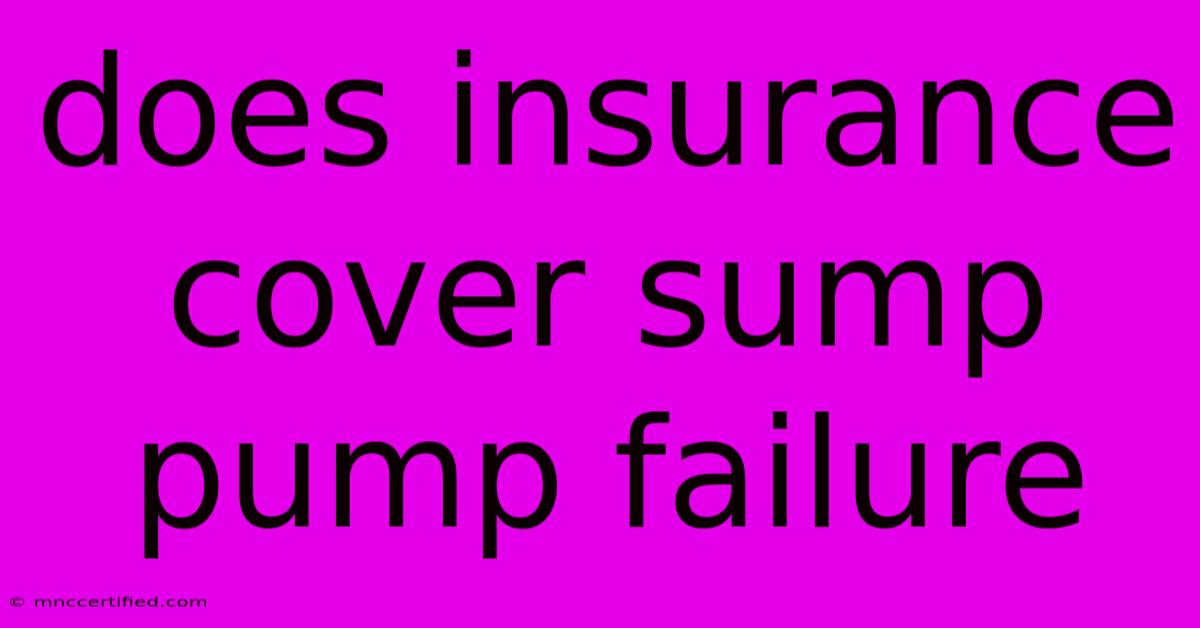Does Insurance Cover Sump Pump Failure

Table of Contents
Does Insurance Cover Sump Pump Failure? A Comprehensive Guide
A sump pump is a vital component of any home with a basement, preventing water damage by removing excess groundwater. But what happens when your sump pump fails? Will your insurance cover the damage? The short answer is it depends.
This article will delve into the complexities of insurance coverage for sump pump failure, providing you with the information you need to understand your policy and be prepared for any potential issues.
Understanding Your Homeowner's Insurance Policy
Homeowner's insurance policies are designed to protect your property against covered perils, like fire, windstorm, and theft. However, sump pump failure is often considered a maintenance issue, not a covered peril. This means your policy may not automatically cover the damage resulting from a failed sump pump.
When Does Insurance Cover Sump Pump Failure?
There are specific circumstances under which your homeowner's insurance might cover damage caused by a sump pump failure:
1. Coverage for Perils:
- Flood Insurance: If you have a separate flood insurance policy, it might cover damage caused by sump pump failure if the failure was due to a covered flood event.
- Power Outage: If the sump pump failed due to a power outage caused by a covered event like a storm or fire, your homeowner's insurance might cover the resulting damage.
2. Coverage for Other Causes:
- Manufacturer Defects: If the sump pump failed due to a manufacturer defect, your homeowner's insurance might cover the damage, especially if the pump is relatively new.
- Improper Installation: If the sump pump was improperly installed, leading to failure, your insurance might cover the damage, depending on the specific circumstances and policy terms.
What Your Insurance Likely Won't Cover
Here are some common scenarios where your homeowner's insurance is unlikely to cover damage from a sump pump failure:
- Normal Wear and Tear: A sump pump that fails due to general wear and tear or lack of regular maintenance is unlikely to be covered.
- Neglect or Improper Maintenance: If you fail to maintain your sump pump regularly, leading to its failure, your insurance company might not cover the damage.
- Backups: If the sump pump fails due to a backup of sewage or other waste, your insurance might not cover the damage, as this is often considered a separate issue.
Ways to Protect Yourself from Sump Pump Failure
Since insurance coverage for sump pump failure can be limited, here are some proactive steps you can take:
- Regular Maintenance: Schedule regular maintenance checks for your sump pump to ensure it's operating properly.
- Back-up Power Source: Install a battery-operated backup power source for your sump pump to ensure it continues operating during power outages.
- Check Your Policy: Carefully review your homeowner's insurance policy to understand the specific coverage for sump pump failure and any relevant exclusions.
- Consider Flood Insurance: If you live in an area prone to flooding, consider purchasing a separate flood insurance policy for additional protection.
Conclusion
While homeowner's insurance might not always cover sump pump failure, understanding your policy and taking preventive measures can help protect your home and your finances. Remember, a properly maintained sump pump is your first line of defense against water damage, and it's crucial to stay informed about your insurance coverage to ensure you're adequately protected.

Thank you for visiting our website wich cover about Does Insurance Cover Sump Pump Failure. We hope the information provided has been useful to you. Feel free to contact us if you have any questions or need further assistance. See you next time and dont miss to bookmark.
Featured Posts
-
Horse Racing Tips Frank Hickeys 25 1 Pick
Nov 09, 2024
-
Fractional Real Estate Investing India
Nov 09, 2024
-
Bronny James G League Debut Sold Out Crowd
Nov 09, 2024
-
Insurance That Covers Cosmetic Surgery
Nov 09, 2024
-
Friday Night Football Best Bets And Odds
Nov 09, 2024